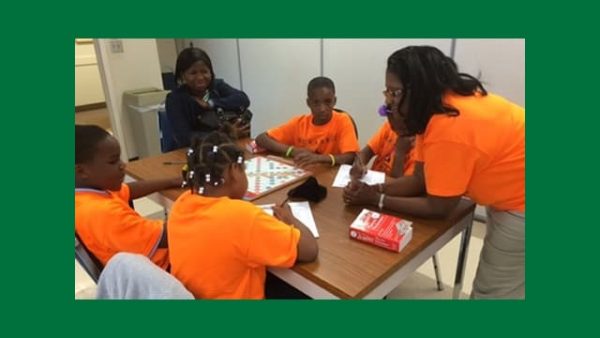Education students create Web resource to improve popular Scrabble program

Making learning fun is a goal for many educators, and starting this fall, resources developed by two College of Education students will make that aim a little bit easier.
Elementary education major Katrina Buchanan and child and family development major Kierra Boyd built a set of online resources to supplement popular Scrabble Clubs at 12 Charlotte-Mecklenburg Schools. Communities in Schools of Charlotte-Mecklenburg (CIS) launched the program last year. Scrabble in Schools pairs students to play the board game for 40 minutes a week. CIS aims to engage students in an activity that they enjoy while building important language and math skills.
This summer, Buchannan and Boyd put together a website with vocabulary tips and Scrabble strategies for students and evaluation tools for teachers. The site is meant to “provide an assessment with meaningful results for teachers and coordinators while still keeping the fun in it for the students,” Buchannan said.
Boyd echoed Buchannan’s thoughts, saying she was drawn to the program to “help young children learn and grow through something fun.”
The pair’s work was made possible through the Charlotte Community Scholars program, a new initiative that pays for students to spend the summer on community-based research projects.
The UNC Charlotte Center for Adolescent Literacies supported Buchannan and Boyd’s efforts on the website. Bruce Taylor, the center’s director, said though College of Education students have many opportunities to be involved in schools, the community scholars program “takes that kind of involvement to a new level.”
“Kierra and Katrina have been agents of change to help improve the quality of this co-curricular program. They’ve not only brought value to the program, but also enhanced it through their own scholarship and creative work,” said Taylor, who also is an associate professor in the Department of Reading and Elementary Education.
Frederico Rios is director of elementary schools and immigrant services at CIS. He said though it’s not yet clear how the Scrabble in Schools program will affect academic scores, there have been encouraging signs. “We do consider it successful from the standpoint of seeing kids get enthusiastic about a game that involves vocabulary, word knowledge, team work, problem solving, math and that critical thinking piece that is so crucial to learning.”
Katrina Buchanan also noticed that enthusiasm. She recalled meeting a boy at Nathaniel Alexander Elementary who was particularly excited about playing Scrabble.
“He had downloaded the app on his phone to play when he isn’t at school,” she said, “The fact that these kids truly enjoyed the program inspired me to create these assessments in a way that they were not aware that they are being assessed.”
Taylor advised the COED students on the project and said they exceeded his expectations in every way.
“It’s clear that these students have a passion for education and are already thinking about their work beyond graduation. They understand the impact that teaching and programs that foster community support can have on students.”
Buchannan and Boyd’s website makes it easier for CIS site supervisors at individual schools measure and standardize the program, which will help the organization improve Scrabble in Schools over time.
“Dr. Taylor, Kierra and Katrina’s work has really revamped the whole focus of the initiative. It answers so many of our implementation questions and helps us to make the most of our program by standardizing it and giving our staff the tools they need to be successful,” said Rios, the CIS director.
Communities in Schools is looking for volunteers for the upcoming academic year; email Federico Rios at frios@cischarlotte.org